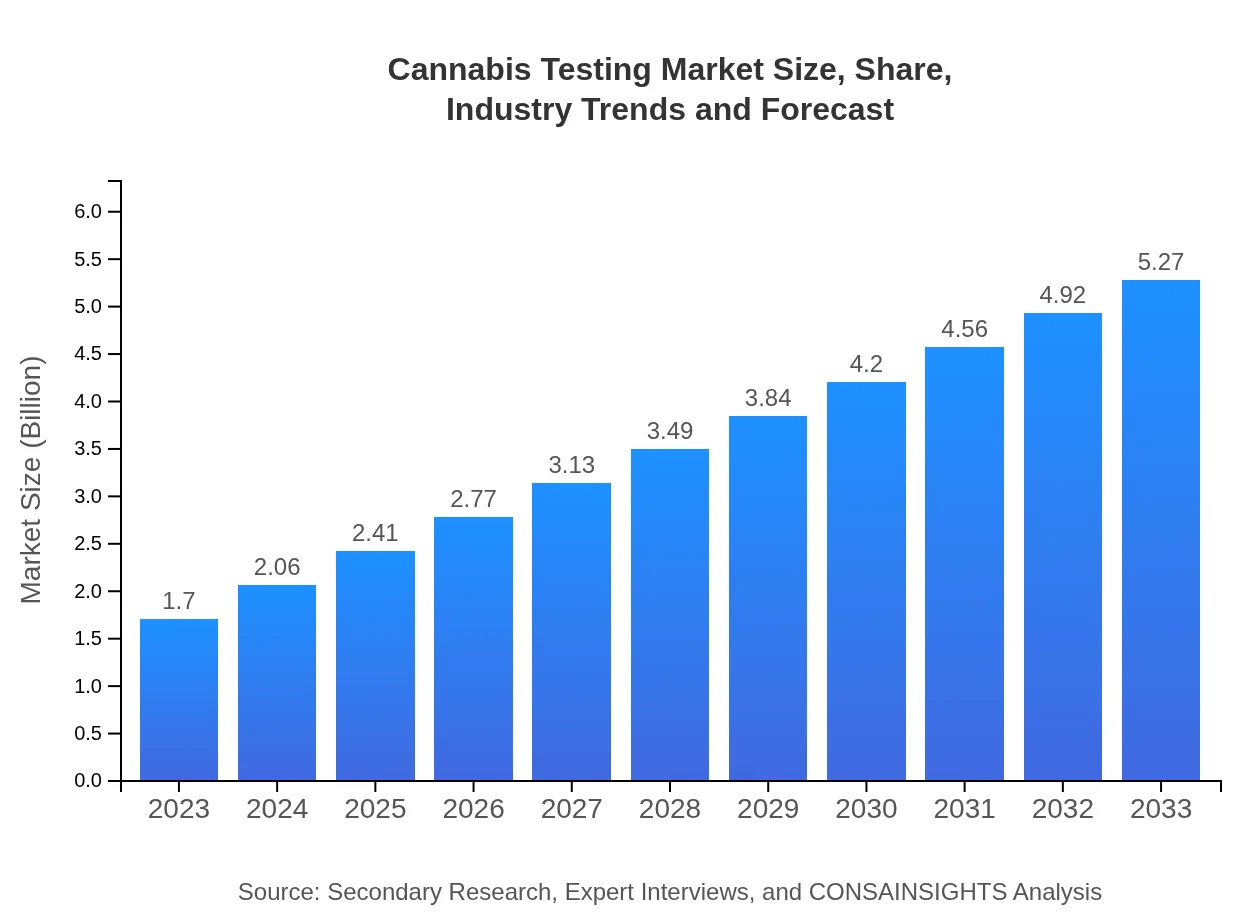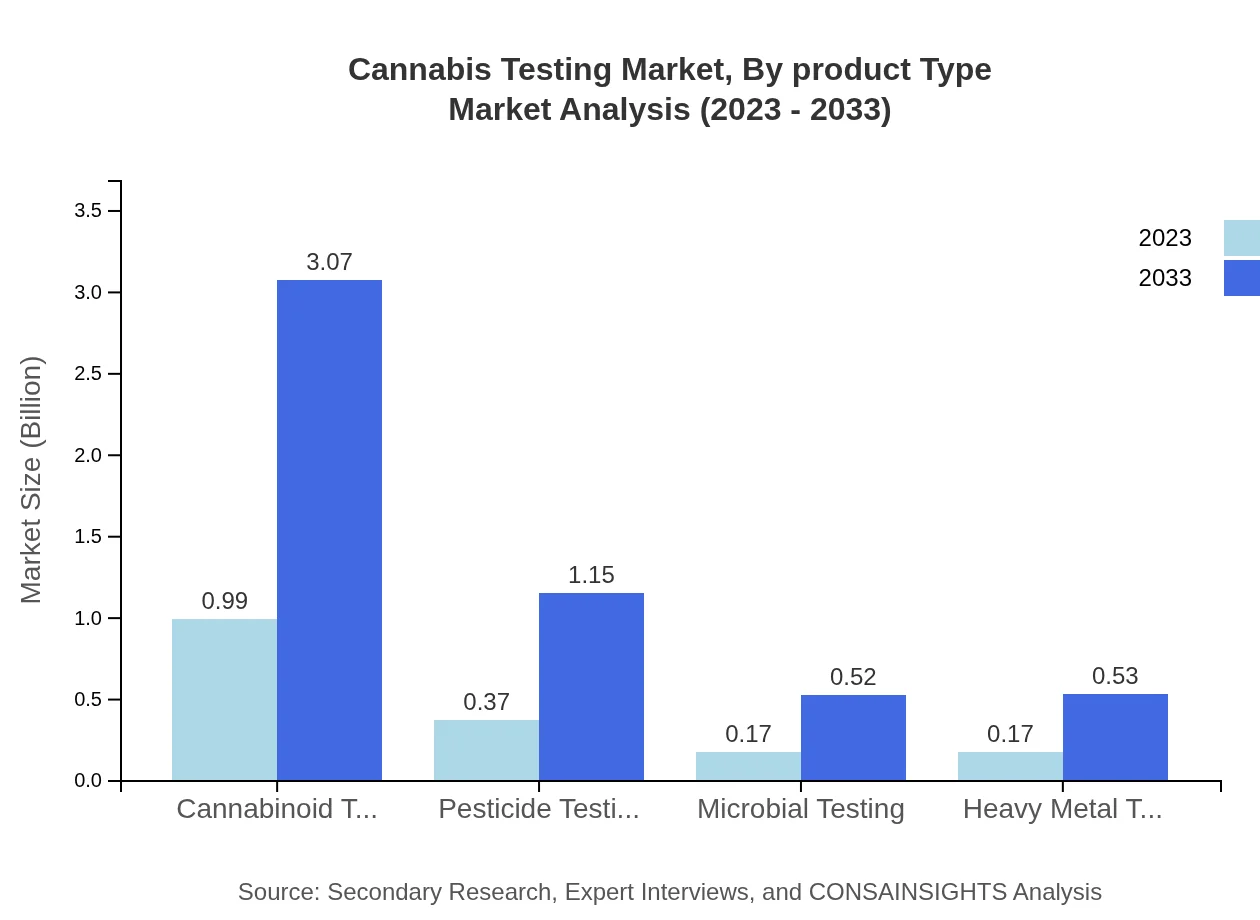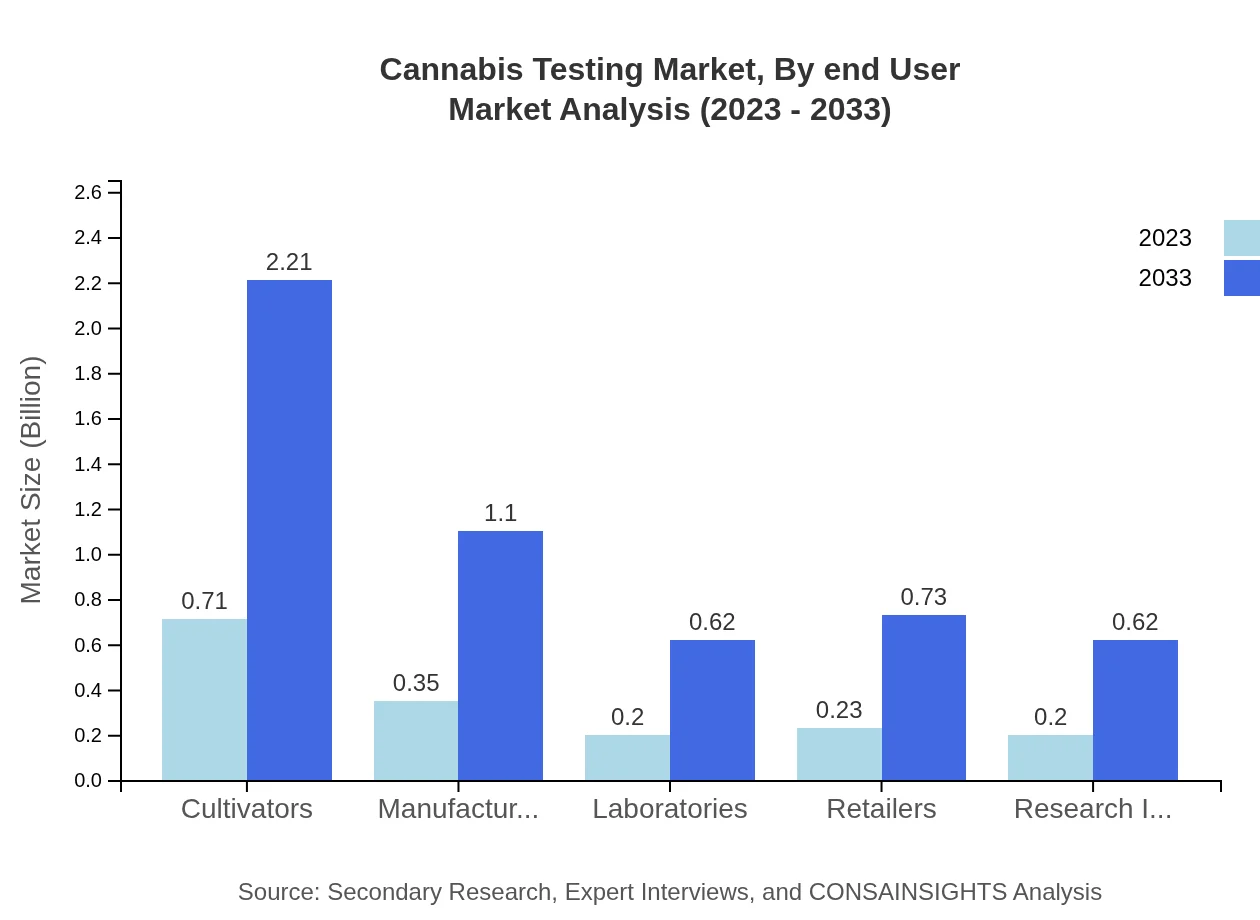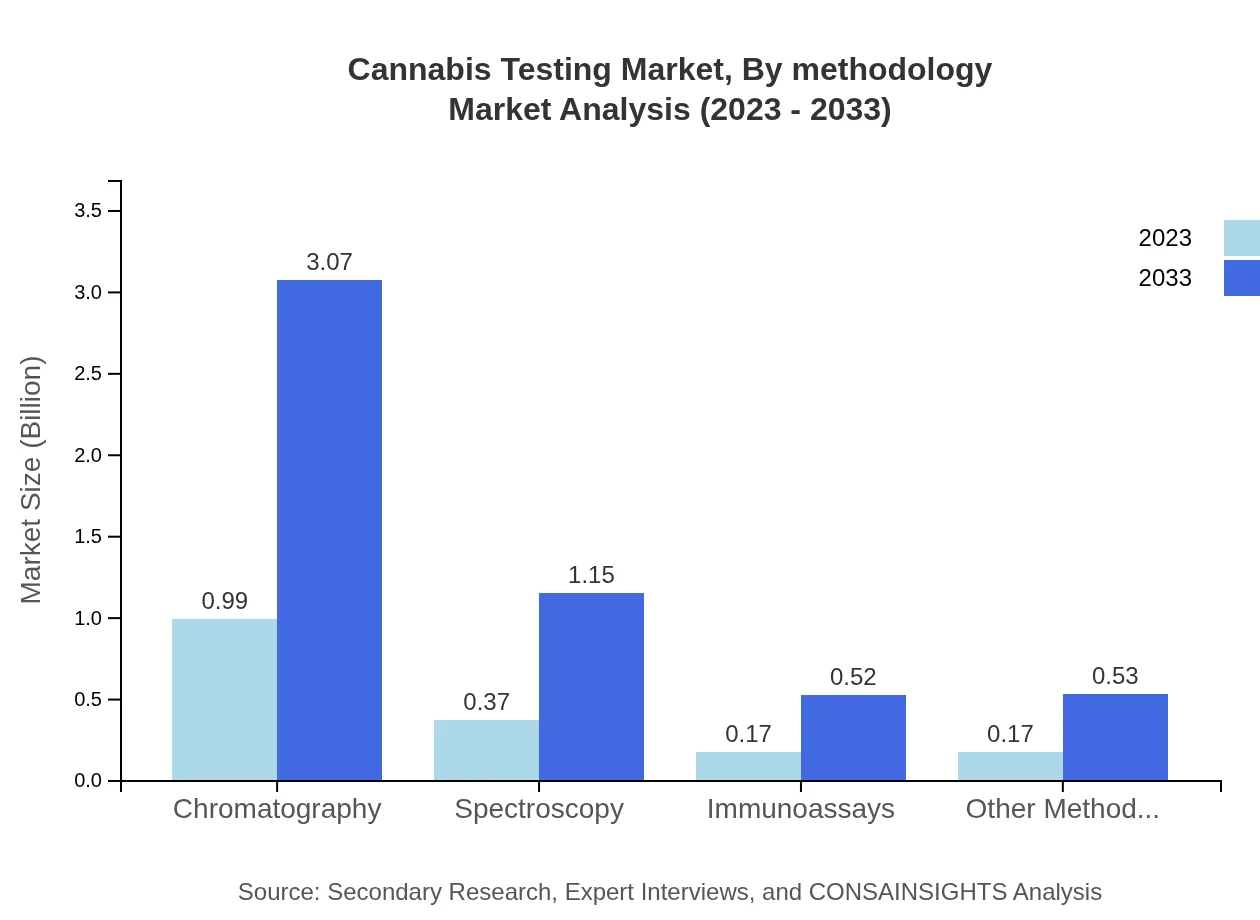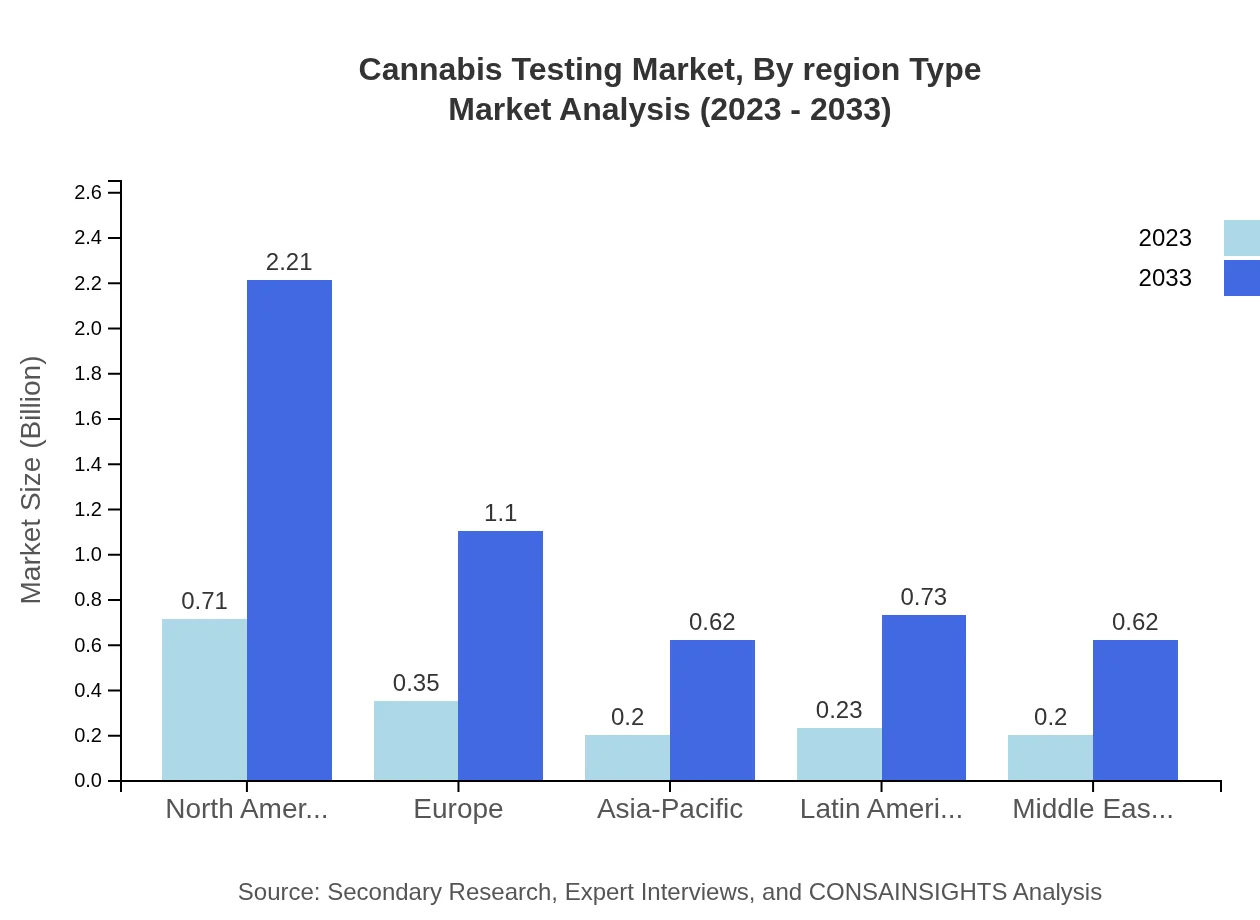Cannabis Testing Market Report
Published Date: 31 January 2026 | Report Code: cannabis-testing
Cannabis Testing Market Size, Share, Industry Trends and Forecast to 2033
This report provides a comprehensive analysis of the cannabis testing market, covering market size, segmentation, regional insights, and future forecasts from 2023 to 2033. It aims to furnish stakeholders with valuable data and projections to support strategic decision-making.
| Metric | Value |
|---|---|
| Study Period | 2023 - 2033 |
| 2023 Market Size | $1.70 Billion |
| CAGR (2023-2033) | 11.5% |
| 2033 Market Size | $5.27 Billion |
| Top Companies | CannaSafe, Steep Hill, SC Labs, Pure Cannalabs |
| Last Modified Date | 31 January 2026 |
Cannabis Testing Market Overview
Customize Cannabis Testing Market Report market research report
- ✔ Get in-depth analysis of Cannabis Testing market size, growth, and forecasts.
- ✔ Understand Cannabis Testing's regional dynamics and industry-specific trends.
- ✔ Identify potential applications, end-user demand, and growth segments in Cannabis Testing
What is the Market Size & CAGR of the Cannabis Testing market in 2023?
Cannabis Testing Industry Analysis
Cannabis Testing Market Segmentation and Scope
Tell us your focus area and get a customized research report.
Cannabis Testing Market Analysis Report by Region
Europe Cannabis Testing Market Report:
In Europe, the market is expected to expand from $0.55 billion in 2023 to $1.70 billion by 2033. The ongoing legalization initiatives in countries like Germany and the United Kingdom will fuel the demand for cannabis testing. Europe’s stringent quality standards will necessitate comprehensive testing protocols for compliance.Asia Pacific Cannabis Testing Market Report:
In the Asia-Pacific region, the cannabis testing market is set to grow from $0.32 billion in 2023 to $1.00 billion by 2033. As several countries begin to relax laws around cannabis, the demand for testing services will rise. Australia and New Zealand are leading this charge, with an increasing number of testing laboratories being established to meet the compliance standards.North America Cannabis Testing Market Report:
North America remains the largest market for cannabis testing, forecasted to grow from $0.58 billion in 2023 to a staggering $1.79 billion by 2033. This significant expansion will be driven by the continued legalization of recreational and medical cannabis across various states in the U.S. and Canada, alongside robust regulatory requirements.South America Cannabis Testing Market Report:
The South American cannabis testing market is characterized by its nascent stage but shows promise with projected growth from $0.05 billion in 2023 to $0.16 billion by 2033. Countries like Uruguay and Colombia are gradually expanding their legal frameworks which will lead to heightened demand for cannabis testing services as production ramps up.Middle East & Africa Cannabis Testing Market Report:
The Middle East and Africa region's cannabis testing market is anticipated to increase from $0.20 billion in 2023 to $0.62 billion by 2033. As discussions around legalization gain momentum, countries like South Africa are leading the way, which is likely to influence the establishment of testing laboratories in this region.Tell us your focus area and get a customized research report.
Cannabis Testing Market Analysis By Product Type
Cannabinoid Testing accounts for the largest share of the market, growing from $0.99 billion in 2023 to $3.07 billion by 2033, representing 58.24% of the market share. Pesticide Testing follows with growth from $0.37 billion to $1.15 billion, holding a share of 21.87%. Microbial Testing and Heavy Metal Testing also contribute significantly, although at lower shares of 9.90% and 9.99%, respectively.
Cannabis Testing Market Analysis By End User
The market is significantly driven by cultivators, who will maintain a dominant stake of about 41.96% by 2033, growing their market size from $0.71 billion in 2023 to $2.21 billion. Manufacturers are projected to hold a steady share of around 20.79%, moving from $0.35 billion to $1.10 billion, while the roles of laboratories, retailers, and research institutions remain vital for the ecosystem's integrity.
Cannabis Testing Market Analysis By Methodology
Chromatography dominates the methodology segment, with a market size expected to grow from $0.99 billion in 2023 to $3.07 billion by 2033, commanding a remarkable 58.24% share. Spectroscopy follows as a reliable method, growing to $1.15 billion while maintaining a 21.87% share. Other methods like Immunoassays and various methodologies make up the remaining significant share.
Cannabis Testing Market Analysis By Region Type
Regional analysis shows North America as the leading market, significantly influencing trends and practices, while Europe showcases a rapidly developing environment due to regulatory advancements. Asia-Pacific presents opportunities as markets evolve with changing legislation. Latin America and the Middle East are emerging but may require more time to establish robust testing frameworks.
Cannabis Testing Market Trends and Future Forecast
Tell us your focus area and get a customized research report.
Global Market Leaders and Top Companies in Cannabis Testing Industry
CannaSafe:
CannaSafe is one of the first licensed cannabis testing laboratories in California, known for its rigorous testing processes and commitment to compliance.Steep Hill:
As a leading cannabis testing laboratory, Steep Hill focuses on developing advanced methodologies to ensure product safety, including their proprietary strain analysis techniques.SC Labs:
SC Labs is recognized for its extensive testing services across the cannabis supply chain, ensuring products meet regulatory requirements in multiple states.Pure Cannalabs:
Pure Cannalabs offers comprehensive testing solutions focusing on cannabinoid profiles, terpenes, and contaminants to elevate industry standards.We're grateful to work with incredible clients.









FAQs
What is the market size of cannabis Testing?
The cannabis testing market is projected to reach $1.7 billion by 2033, growing at a CAGR of 11.5% from its current size. This growth reflects increasing regulations and consumer demand for safe, quality cannabis products.
What are the key market players or companies in this cannabis Testing industry?
Key players include leading laboratories and testing companies that specialize in cannabinoid profiling, pesticide testing, and safety analysis, which are instrumental in ensuring regulatory compliance and consumer safety in cannabis products.
What are the primary factors driving the growth in the cannabis Testing industry?
Growth is mainly driven by stricter regulations, increasing consumer awareness of product quality, and the expanding legal cannabis market, contributing to a robust demand for reliable testing services across various cannabis products.
Which region is the fastest Growing in the cannabis Testing?
North America currently leads the market, with projections showing growth from $0.58 billion in 2023 to $1.79 billion by 2033. Other regions like Europe and Asia-Pacific also show significant growth potential.
Does ConsaInsights provide customized market report data for the cannabis Testing industry?
Yes, ConsaInsights offers tailored market reports that cater to specific needs within the cannabis-testing industry, including detailed analysis on market trends, key players, and regional insights.
What deliverables can I expect from this cannabis Testing market research project?
Deliverables include comprehensive reports covering market size, growth projections, detailed segmentation, regional analysis, competitive landscape, and actionable insights tailored to your business objectives.
What are the market trends of cannabis Testing?
Emerging trends include advancements in testing technology, increasing focus on safety and compliance, and a shift towards more sophisticated testing methodologies such as chromatography and spectroscopy.

